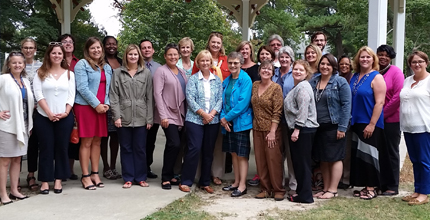SSW Helps Rural Youth Avoid Homelessness
The University of Maryland School of Social Work (SSW) has been awarded a three-year, $2 million implementation grant from the U.S. Department of Health and Human Services, Administration on Children and Families, Children’s Bureau to end and prevent homelessness among youth and young adults on living in Maryland's mid-Shore region.
These are young people with current or prior child welfare (foster care) involvement. The grant, known as Thrive@25, is the second phase of work that was started under a two-year Children’s Bureau planning grant awarded to the SSW in 2013.
Thrive@25 is led by The Institute for Innovation & Implementation at the SSW, in partnership with the Maryland Department of Human Resources (DHR), the Talbot County Department of Social Services on behalf of the five local departments of social services on the rural Mid-Shore, and the National Center for Housing and Child Welfare.

Staff members of the University of Maryland School of Social Work's Institute for Innovation & Implementation; the National Center for Housing and Child Welfare; and the Departments of Social Services in Caroline, Dorchester, Kent, Queen Anne's, and Talbot counties were among partners who met to collaborate on carrying out the Thrive@25 grant.
“This award represents an opportunity for us to continue to build upon our incredible partnerships on the Eastern Shore and implement strategies to end and prevent homelessness among our youth,” Sharp notes. The five jurisdictions are Dorchester, Caroline, Kent, Queen Anne’s, and Talbot counties.
During Phase II, Maryland will implement a multifaceted intervention responsive to the individual needs and strengths of youth transitioning from foster care—one that is culturally responsive to the needs of minority and LGBTQ youth and relevant to rural and non-rural communities across Maryland and the nation.
“Thrive@25 is a unique university-state-local-nonprofit partnership that is focused on implementing and sustaining high quality, effective interventions that are trauma-informed and responsive to the strengths and needs of youth and young adults in foster care,” says Deborah Harburger, MSW ’04, program director at The Institute and Thive@25 Phase I project director.
Thrive@25 builds upon the capacity of Maryland’s child welfare system to prevent homelessness among the most at-risk youth with child welfare involvement. The grant will install, implement, refine and evaluate an intervention model that is grounded in implementation science and a commitment to trauma-informed care to improve four core outcomes: stable housing, permanent connections, education/employment, and social-emotional well-being.
“During Phase I, Thrive@25 provided the necessary resources, technical assistance, evaluation and support to enable our Ready by 21 Committee to develop a strategic plan which was the basis for the Phase II application,” says April Sharp, MSW ’82, LSCW-C, director of the Talbot County Department of Social Services. The committee reference is to the DHR program, Ready by 21, which helps ensure foster youth are as prepared as possible for independent living by the time they reach age 21.
Phase II Project Director Ryan Shannahan, MSW ’11 says, “Thrive@25 is an unprecedented opportunity to prevent homelessness among our most vulnerable citizens and will greatly contribute to national efforts to end youth homelessness by 2020. The model being implemented in Maryland’s Eastern Shore will not only have significant implications for our state, but for the entire country as well.”
Thrive@25 will benefit from the lessons learned from Youth REACH MD, a concurrent state-level effort to obtain accurate, detailed information on the number, characteristics, and needs of unaccompanied homeless youth and young adults in Maryland.
“The evaluation that is part of Thrive@25 has been monumental—it has enabled us to start to paint a picture of what life is like for Maryland’s former foster youth. Through this we have been able to develop a specific plan to help better prepare our foster youth to exit child welfare into young adulthood,” comments Elizabeth Greeno, PhD ‘08, MSW ’98, LCSW-C, research associate professor and principal investigator for Thrive@25.
Of the 18 Phase I recipients, all were eligible for Phase II funding, which was awarded only to the SSW and five other entities.
“It is an honor to be a part of the Thrive@25 team and to have the opportunity to work with so many partners who are so committed to ensuring that youth and young adults leaving foster care have been given the necessary resources and have access to—and know how to access—services, supports, and interventions to be successful in adulthood,” says Ruth White, MSSW, Executive Director of the National Center for Housing and Child Welfare.
Thrive@25 focuses on youth in the five Mid-Shore counties entering foster care between ages 14-17, youth in foster care who are ages 18-21, and homeless youth and young adults under 21 with child welfare histories. These youth and young adults will be identified as being high, medium or lower risk for experiencing homelessness based on a constellation of risk and protective factors, and service planning and delivery will be tailored accordingly. This identification will be done through the piloting of a new risk survey that was developed with input from youth and young adults in the priority populations, foster parents, and caseworkers during Phase I.



